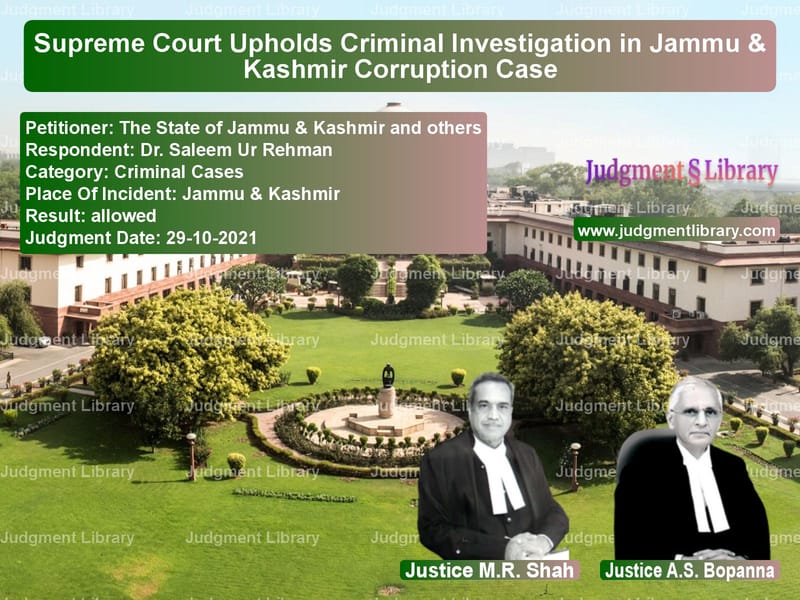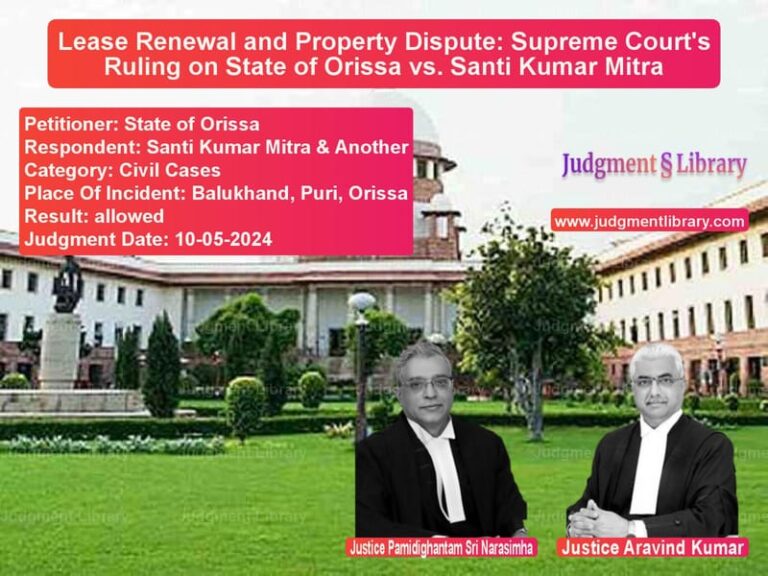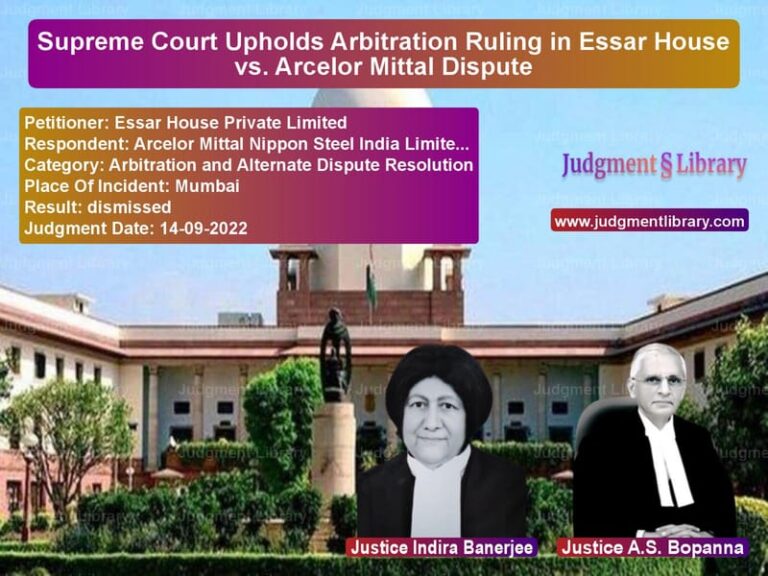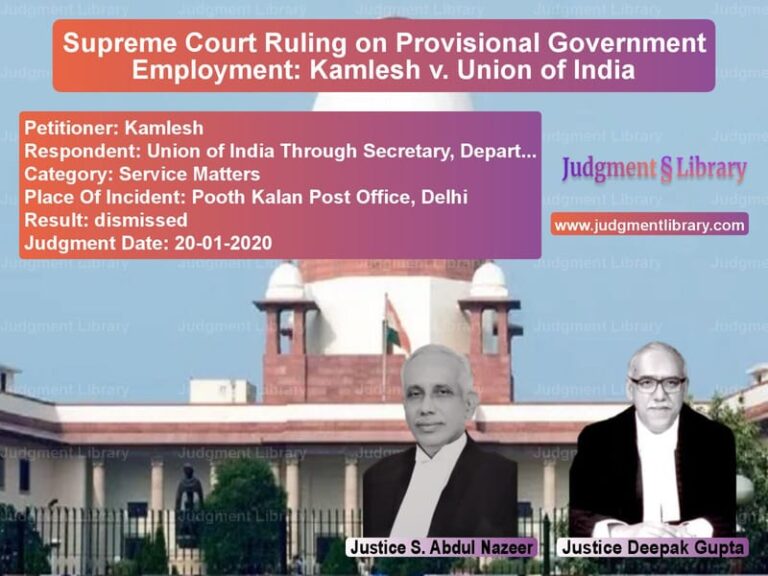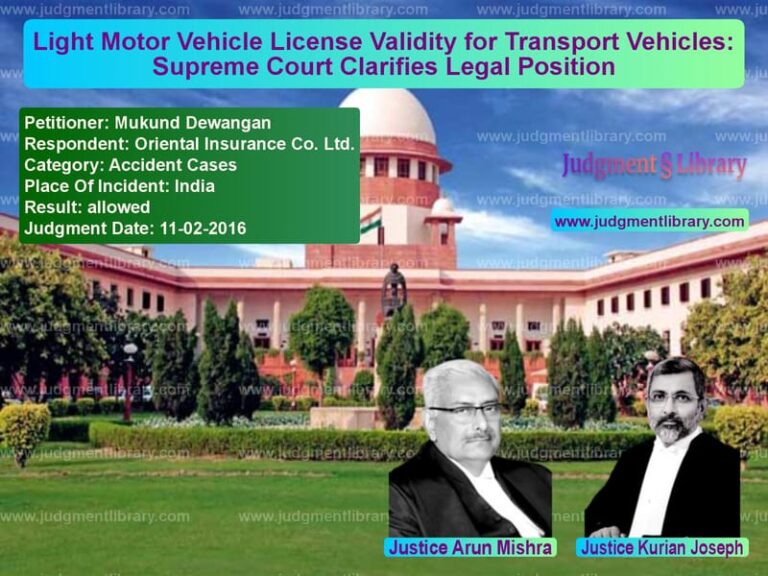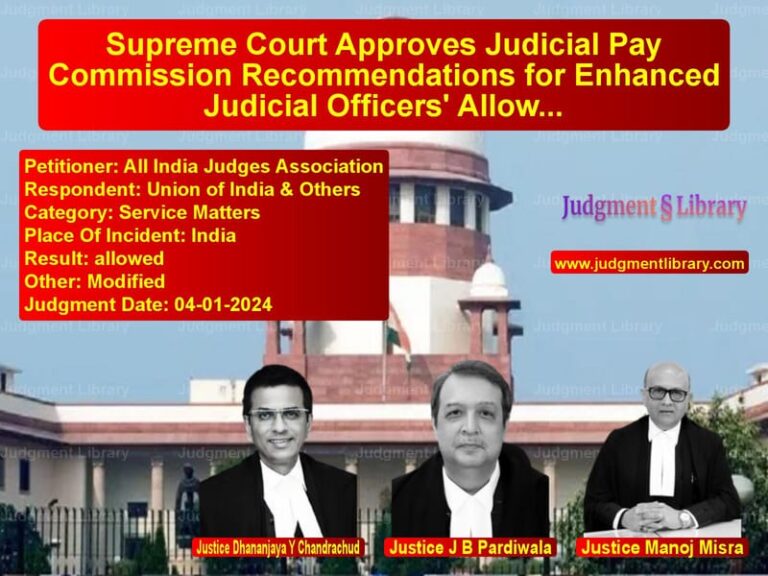Supreme Court Upholds Criminal Investigation in Jammu & Kashmir Corruption Case
The Supreme Court of India, in the case of The State of Jammu & Kashmir and Others vs. Dr. Saleem Ur Rehman, ruled on the validity of criminal proceedings against a senior health official accused of corruption. The case involved alleged misappropriation of funds under the National Rural Health Mission (NRHM) and raised crucial questions about procedural compliance in anti-corruption investigations.
Background of the Case
The case stemmed from an FIR registered in 2012 against Dr. Saleem Ur Rehman, a senior official in the Health Department of Jammu & Kashmir, under Section 5(1)(d) read with Section 5(2) of the J&K Prevention of Corruption Act, 2006, and Section 120B of the Ranbir Penal Code. The allegations involved procurement irregularities in the purchase of medical kits, leading to financial losses to the government.
The respondent moved the Jammu & Kashmir High Court, seeking to quash the FIR and all proceedings against him, citing procedural lapses and a lack of proper authorization for investigation. The High Court ruled in his favor and quashed the proceedings. Dissatisfied with this decision, the State of Jammu & Kashmir challenged the ruling before the Supreme Court.
Legal Issues Before the Supreme Court
The Supreme Court had to examine:
- Whether the authorization for investigation complied with the second proviso to Section 3 of the J&K Prevention of Corruption Act, 2006.
- The validity of the preliminary verification conducted before the registration of the FIR.
- Whether Rule 3.16 of the Vigilance Manual, 2008, was consistent with the procedural safeguards established in Lalita Kumari v. Government of Uttar Pradesh.
- Whether the requirement of prior sanction under Section 155 of the J&K Cr.P.C. applied in cases involving both cognizable and non-cognizable offences.
Petitioners’ (State of Jammu & Kashmir) Arguments
The State of Jammu & Kashmir contended that:
- The authorization for investigation was legally sound and complied with the governing provisions.
- The FIR was registered based on a detailed preliminary verification that confirmed prima facie evidence of corruption.
- The High Court misinterpreted Section 155 of the J&K Cr.P.C. by holding that an investigation involving both cognizable and non-cognizable offences required prior sanction.
- Rule 3.16 of the Vigilance Manual was in line with established legal principles and did not contradict the Supreme Court’s judgment in Lalita Kumari.
Respondent’s (Dr. Saleem Ur Rehman) Arguments
The respondent, in his defense, argued that:
- The investigating officer had no valid authorization to proceed with the case, rendering the entire investigation void.
- The preliminary verification process exceeded permissible limits and amounted to an unauthorized inquiry.
- The FIR was based on a prolonged verification process that failed to adhere to legal safeguards.
- The High Court was correct in quashing the proceedings as they were initiated in violation of established procedural norms.
Supreme Court’s Observations
The Supreme Court analyzed the procedural framework and made the following key observations:
1. Validity of Investigation Authorization
The Court held that the investigation was valid under the second proviso to Section 3 of the J&K Prevention of Corruption Act, 2006:
“The authorization granted for investigation was in accordance with the statutory framework, and the High Court’s conclusion to the contrary was erroneous.”
2. Legitimacy of Preliminary Verification
The Court clarified that preliminary verification in corruption cases serves a crucial role in determining whether an FIR should be registered:
“The preliminary verification in the present case was conducted in compliance with legal principles and provided a valid basis for registration of the FIR.”
3. Applicability of Section 155 of the J&K Cr.P.C.
The Supreme Court rejected the High Court’s interpretation and held:
“Where the primary offence is cognizable, the requirement of prior sanction under Section 155 of the J&K Cr.P.C. does not arise.”
4. Legality of Rule 3.16 of the Vigilance Manual
The Supreme Court upheld Rule 3.16, noting:
“Rule 3.16 is consistent with the principles laid down in Lalita Kumari and serves as a guiding mechanism for initiating corruption investigations.”
Final Judgment
The Supreme Court set aside the High Court’s ruling and reinstated the criminal proceedings against the respondent. The Court held:
“The FIR against the respondent is legally sustainable, and the High Court’s interference was unwarranted. The investigation must proceed in accordance with the law.”
Key Takeaways
- The Supreme Court reaffirmed that criminal proceedings cannot be quashed based on procedural technicalities if substantial evidence exists.
- Preliminary verification is a valid method for ensuring that FIRs are not registered arbitrarily in corruption cases.
- The requirement of prior sanction under Section 155 of the J&K Cr.P.C. does not apply when a case involves cognizable offences.
- The Supreme Court’s ruling ensures accountability and prevents unwarranted interference in corruption investigations.
Conclusion
This judgment upholds the principle that corruption investigations must be allowed to proceed unless there is a fundamental legal defect. By reinstating the proceedings, the Supreme Court reinforced the need for transparency and accountability in public office.
Read also: https://judgmentlibrary.com/supreme-court-grants-bail-in-uapa-case-a-detailed-legal-analysis/
Judges: The judgment was delivered by M.R. Shah and A.S. Bopanna.
Petition Result: Allowed
Petitioner Name: The State of Jammu & Kashmir and others.Respondent Name: Dr. Saleem Ur Rehman.Judgment By: Justice M.R. Shah, Justice A.S. Bopanna.Place Of Incident: Jammu & Kashmir.Judgment Date: 29-10-2021.
Don’t miss out on the full details! Download the complete judgment in PDF format below and gain valuable insights instantly!
Download Judgment: the-state-of-jammu-&-vs-dr.-saleem-ur-rehman-supreme-court-of-india-judgment-dated-29-10-2021.pdf
Directly Download Judgment: Directly download this Judgment
See all petitions in Bail and Anticipatory Bail
See all petitions in Fraud and Forgery
See all petitions in Money Laundering Cases
See all petitions in Extortion and Blackmail
See all petitions in Attempt to Murder Cases
See all petitions in Judgment by Mukeshkumar Rasikbhai Shah
See all petitions in Judgment by A. S. Bopanna
See all petitions in allowed
See all petitions in supreme court of India judgments October 2021
See all petitions in 2021 judgments
See all posts in Criminal Cases Category
See all allowed petitions in Criminal Cases Category
See all Dismissed petitions in Criminal Cases Category
See all partially allowed petitions in Criminal Cases Category

